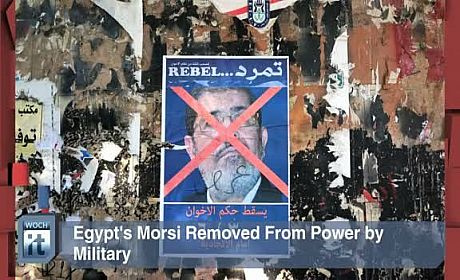President’s Greed Led to His Downfall

The gathering of Mohammad Morsi’s opposition in Tahrir Square within the last few days led to the same outcome for the elected president as for Hosni Mubarak previously. Who were the Morsi opponents who ultimately forced him to stay at home?
Morsi’s opponents include all socio-political groups in Egypt, except the Muslim Brotherhood and the radical Salafis. This means that, with the exception of these two groups, all the other political groups and movements are among the opposition; meaning that the independent Islamists, liberals, seculars, nationalists, and the elements of the former regime form the main body of Morsi’s opposition.
What are the roots of the opposition against Morsi? What are the opposition’s demands?
Their demands are, in fact, concentrated demands. The story began when, following the downfall of Hosni Mubarak, Egypt’s political groups demanded a new constitution to be written. Nevertheless, some of the political groups stated that first we must hold presidential elections and then revise and reform the existing constitution, and at the forefront were the Muslim Brotherhood and the military. Revolutionary youths were not able to attract the cooperation of the political groups and the Muslim Brotherhood succeeded in their attempts to pursue their objective, thus, the president was elected and parliamentary elections were also held, in which the majority was gained by members of the Muslim Brotherhood and 20% by the Salafis. Of course, the votes of the Muslim Brotherhood were lower in the presidential election and Morsi, with a small margin, won the election against his rival, Ahmed Shafik. One reason was the boycott of the election and the non-participation of many people. Furthermore, some groups voted for Morsi to prevent the election of Shafik. Later, when the Muslim Brotherhood came to power, they became greedy. They gained the power which for years they had waited for and attempted to maintain it in every possible way and eliminate the others. Therefore, the opposition was gradually formed against the Muslim Brotherhood. In order to find an ally, they interacted with the radical Islamists and the Salafis. This interaction had no ideological root for the Muslim Brotherhood and was merely political. Since these Salafi groups were supported by the reactionary Arab countries, Morsi was forced to become close to these countries. He travelled to Saudi Arabia to gain its support for his government, for if the Egyptian labor forces who were working in the Persian Gulf littoral states were to be dismissed from their jobs, a lot of pressure would have been put on the government of Egypt. Therefore, both of these Arab countries benefited from this situation and the government was forced to bribe the Salafi groups and its cooperation with them grew, even though ideologically they were totally different.
The greed of the Muslim Brotherhood reached the point that gradually they could not tolerate even some of their own friends. It should be noted that when Abdel Moneim Aboul Fotouh, one of the leaders of the Muslim Brotherhood, became a presidential candidate, they dismissed him from his membership. They treated the others similarly. Besides, when the military arrested the revolutionary youth of “Thawrat al-Shabab” and imprisoned them, the Muslim Brotherhood, who were not dissatisfied with the weakening of these revolutionary youths, took no steps to free them.
Furthermore, the economic and security situation in Egypt was a disaster. During Mubarak’s presidency, people were not as poor and the insecurity was not as severe. Morsi promised to solve these problems in 100 days, but one year has passed since the beginning of his government and he has not been able to fulfill his promises. All these issues exerted pressure on Morsi and united all other groups against his government.
It was the army that ultimately ended Morsi’s presidency. Why wasn’t Morsi able to move the army along with him during this time?
It was obvious that differences between the army and Morsi would grow. The army intends to maintain calm in Egypt and when Morsi is unable to perform this task, the army enters the scene. The people who are in the scene have welcomed the army’s statement and demand the removal of Morsi’s government. The army has stated that it does not intend to control power, but rather to support the demands and rights of the people. Therefore, the contradiction between the army and Morsi increases.
What is Morsi’s future under these conditions?
I believe that Mr. Morsi has to surrender to the people’s demands; otherwise the protests will become more severe. During the past few days, a number of people have been killed and the offices of Morsi’s party and the Muslim Brotherhood have been set ablaze. In order to fight against the “civil disobedience” movement, Morsi has resorted to the Muslim Brotherhood. It means that Morsi has brought the Muslim Brotherhood into the scene. Nevertheless, the “civil disobedience” movement has petitioned 22 million signatures for Morsi’s dismissal. This is while the Muslim Brotherhood has only gathered 11 million signatures for him to remain in power. Under these conditions when Egypt’s judiciary has also joined the ranks of the opposition, it seems that Morsi would not be able to maintain his position.
Does the opposition agree on the future of Egypt and its future leadership, or will there be differences among them about Egypt’s future right after Morsi’s removal?
The opposition has not yet declared any leadership, but the developments of the past few years have certainly led them to reach the conclusion that if they intend to succeed, they have to interact positively with each other. They have comprehended that the Muslim Brotherhood was able to lead the movement due to its organization; hence, if they do not succeed in reaching an agreement with regard to the future leadership of Egypt, they may suffer a heavy blow from the Muslim Brotherhood for a second time.

